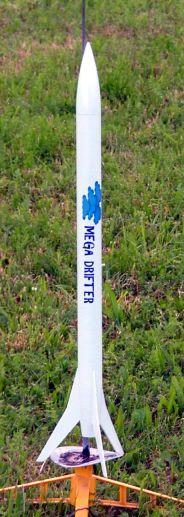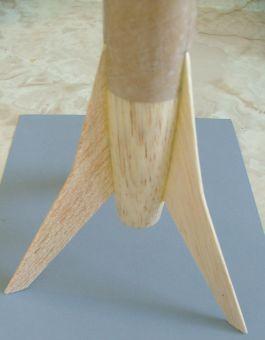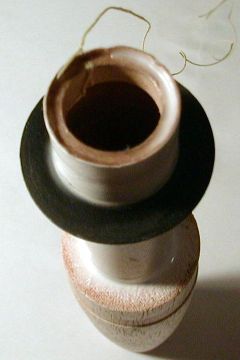| Construction Rating: | starstarstarstarstar |
| Flight Rating: | starstarstarstarstar |
| Overall Rating: | starstarstarstarstar |
| Manufacturer: | Rocket Pad |

Brief:
This is an upscaled version of an old Estes kit. Also, it has a new unique
decal that makes it really stand out! I have built other Rocket Pad kits and
they seem to get better with each one. This is a single stage rocket using 24mm
C11 and D motors. It uses an 18" parachute, balsa fins, plastic nose cone,
and a machine turned balsa boat tail--not paper--in the rear. The kit was
packaged in a poly bag with the parts inside all neat & undamaged. The
package kit description was on large card cardstock with a clear picture of the
kit.
Construction:
There is an 18" BT-60 body tube that looks like the type Estes uses, a
sheet of 3/32" balsa, a fin template for the 3 fins, and a quality plastic
nose cone. The motor mount is with an 8" long BT-50 tube that is glued
into the boat tail along with a laser cut fiber centering ring at the top of
the motor tube to center inside the main body tube. There is a length of
Kevlar®
cord that is tied to the motor block in the top of the motor tube. Also
included is a blank motor case to push up the motor block into the proper
location. The shock cord is a 1/4" white elastic type. The kit is rated
skill level 3 and I think that's a good assessment. The fins are made from
quality balsa like the last Rocket Pad kit I built, and you don't need to use
any CA to make the fins stronger.

The instructions guided you through 30 steps on 3 pages. There is included a few photo pages to show how different parts of the rocket go together. The instructions are like a lot most LPR kits. You start by assembling the motor mount to the balsa boat tail, motor block, and Kevlar® cord mount. The boat tail on this kit was better than the last RP kit I built, with a finer grain balsa and the fit was just right. The only thing you have to be careful about in assembling this kit is when you push in the motor block with the blank motor casing. You must push it in to the mark on the casing in one motion and quickly pull it out. Just don't stop for a second or it could get stuck in the wrong spot. The rest of the construction is straight forward, mark the fin placement with the enclosed fin marking guide, cut the fins, and match sand them. Then you sand the root edge of the fins to make sure they contour to the slope on the boat tail--that is the only real tough part of this build, but that is why it's a skill level 3 kit. Take your time with this step and there shouldn't be any problems! Finally, you assemble the recovery system and add fillets to the fins and launch lug. The weight of my kit when all done was 3.4 oz. Close to what was listed for the kit. I would say the build has no CONs as long as you follow the instructions.

Finishing:
Finishing is just like most any LPR rocket kit with balsa: seal the fins with a
sealer, make sure you sand any mold marks from the nose cone (although mine did
not need much at all), and then paint it. I used Krylon Gloss White as the
photo on the header card showed. By the way, the boat tail sealed with only 3
coats. The decals were consistent with the nice quality ones that came in other
Rocket Pad kits and they look "way cool" as my son said it! Yea they
are cool! They make the kit! I used a Gloss clear over the decals to protect
them.
Construction Rating: 5 out of 5
Flight:
The motor retention is by friction fit so I wrapped a length of masking tape
around the motor and put in a few sheets of recovery wadding. There was no wind
the day I launched it. It lifted off the pad with lots of smoke in a straight
line and a very stable flight to maybe 300 feet. We went out a few days later
on a day with some wind & launched it with a D12-5 for its second flight.
It was a straight flight again but real high! I had another problem with my
camera and did not catch the liftoff.
Recovery:
The mylar parachute had plenty of room in the BT-60 tube. The shock cord is
tied to the Kevlar®
cord and the nose cone, where the chute is connected. Recovery was good on the
first flight as it came down slowly about 15 feet from the pad. I love days
when there is no wind! However, it did drift a bit as the wind gave a gust but
still a good recovery for its second flight. There were no con's in recovery,
no damage on touch down, even the balsa boat tail was fine.
Flight Rating: 5 out of 5
Summary:
Rocket Pad kits continue to get better with each release! As long as you follow
the instructions, this kit should be no problem to build and provide excellent
flights.
Overall Rating: 5 out of 5
 |
 |